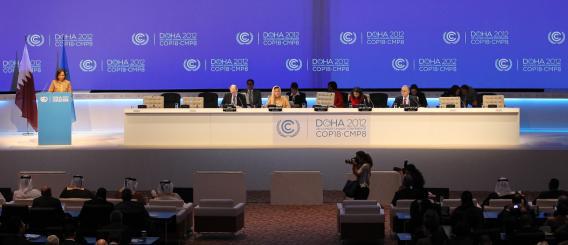This week in stories likely to be overshadowed in the United States by the fiscal cliff, football, online shopping, the holidays, and any other untold number of topics: climate change.
That’s nothing new, of course, but it’s worth pointing out given the U.N.’s latest round of climate talks began in Doha, Qatar, on Monday morning. The international negotiations are likely to generate few headlines in the United States, something that is partly because the climate/energy conversation at home has been swallowed whole by the the current focus on the budget, and partly because, well, the talks themselves have never really come close to producing the type of breakthrough that would be needed to curb global greenhouse gas emissions that scientists say are warming the planet.
Three years ago in Copenhagen, for example, negotiators failed to agree on a climate change treaty despite an 11th-hour appearance by President Obama. Last year, the most negotiators could come together on was an agreement to try again for one by 2015—which would then in theory go into effect in 2020.
As the Associated Press explains, with a major agreement seemingly still out of reach, this year’s talks are going to focus instead on getting together a stopgap extension of the Kyoto Protocol, the 1997 treaty that the United States never signed on to that is set to expire next month.
At the current talks, the United States is already taking some heat for the Bush administration’s decision to pull out from the Kyoto Protocol and the nation’s larger reluctance to make a major climate commitment in the years that followed. Here’s what the American delegate Jonathan Pershing said in defense (via the AP):
“Those who don’t follow what the U.S. is doing may not be informed of the scale and extent of the effort, but it’s enormous … It doesn’t mean enough is being done. It’s clear the global community, and that includes us, has to do more if we are going to succeed at avoiding the damages projected in a warming world.”
As the Guardian notes, global emissions are still climbing overall despite the reduction of emissions by many of those countries following the Kyoto Protocol. In other words, such an agreement doesn’t really work unless enough countries sign on to it. And as the failure of the Copenhagen treaty illustrated, a more meaningful climate change agreement would have to tackle the tensions between developing and developed nations. Bjørn Lomborg goes into that tension in more detail in his summary of last year’s talks.
